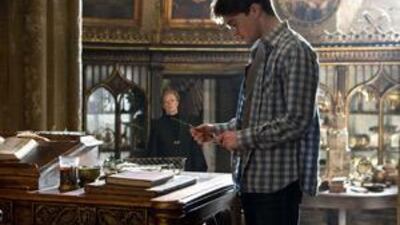The most significant moment in Harry Potter and the Half-Blood Prince occurs just before the end of the first act. Here, befitting a film franchise that is neurotically addicted to formula, the Hogwarts students, as they do in every Potter film at this point, are taking their places in the Grand Hall for the annual opening address by the school principal, Professor Dumbledore (Michael Gambon). Harry (Daniel Radcliffe), however, arrives late, face mildly bloodied from a brutal encounter with Draco Malfoy (Tom Felton). Harry dismisses the minor wound, but his loyal friend Hermione (Emma Watson) nonetheless turns halfway towards her prospective boyfriend, Ron (Rupert Grint), and halfway towards the camera, and wryly declaims: "He's covered in blood again! Why is he always covered in blood?"
It is a sweet and unexpected slice of wink-wink irony from a series that, so far, has never dreamt of such things. More importantly, it suggests a new departure and a new maturity for a brand that has made more than $3 billion (Dh11bn) at the international box office but proven repeatedly that slipshod, uninspired plotting, broad adult performances and stiff children's turns can be, given the right context (in this case a global literary phenomenon), the bland face of modern screen success.
It is, in other words, all changing with the Half-Blood Prince. Here, in a film written by the 49-year-old Texan Steve Kloves (The Fabulous Baker Boys) and directed by the UK TV veteran David Yates (State of Play, the series), JK Rowling's overloaded and stodgy source novel is treated respectfully yet loosely. Thus we are denied a series of crucial flashbacks later on in the tale, but we gain a bravura opening sequence in which a team of ghastly Death Eaters (cohorts of Ralph Fiennes's dark Lord Voldemort) fly over central London and destroy the Millennium Bridge.
From there onwards, the film calls a seemingly penitent cessation to the kind of inane CGI spectacle that has dogged previous outings (Giant spiders? Dragons? House elves?) and instead concentrates on, gasp, character work. In short, though the chattering teen protagonists learn that Voldemort is planning an attack on Hogwarts and that his minions are attempting to infiltrate the castle from within, they would all much rather, well, party. Thus, filling almost the entire second act of the film, the young heroes drift from a dinner party with the new potion teacher Professor Slughorn (Jim Broadbent), to a riotous post-Quidditch party in the student quarters, to a lavish Christmas party that comes complete with partners, music and flirtations. Along the way, Hermione falls even deeper in love with Ron, Harry loses his heart to Ron's sister, Ginny (Bonnie Wright), and Ron is romantically sucker-punched by the headstrong Lavender Brown (a gusty comic turn from Jessie Cave).
Best of all, the three leads, whose performances have previously tended to be of the nails-along-the-blackboard variety, are remarkably proficient. There's even a late-night scene between Harry and Ron, where they awkwardly discuss the merits of Ginny's skin, that demonstrates some knockout timing and deft delivery from both actors (in this, Grint is the more skilful performer, while Radcliffe is still burdened with a defensive gurning smile as his default setting).
Of course, this deft and unfussy character work may prove a hard sell for younger Potter fans who are more used to the schoolboy thrills of expecto patronum, Hagrid's hut and Dumbledore's Pensieve. As if appealing directly to them, the film suddenly and awkwardly shifts tone in the final act - except for The Goblet of Fire, which had a clear three-goal narrative, structure has never been big in the Harry Potter world. Instead, lurching episodically, which is instinctive on the page, is ultimately what these films do. Consequently, the dark side, as commanded by Alan Rickman's turncoat Professor Snape, takes control of Hogwarts and wreaks some furious vengeance; a major character, for those who haven't read the books, is killed. Indeed, it is hugely appealing to witness the emerging endgame of Voldemort (only two more movies left!), and yet simultaneously frustrating to realise just how much the series has been lazily treading water with the master narrative until now.
The hope remaining for this fantasy brand, like The Lord of the Rings before it, is that the end will bring the best work yet. On the evidence of the Half-Blood Prince, we could be in for a handsome finale indeed.

